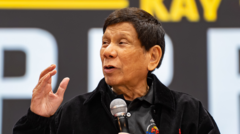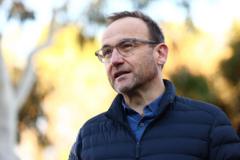Following the recent Philippines mid-term elections, tensions rise as President Ferdinand "Bongbong" Marcos Jr and Vice-President Sara Duterte face a potential political divide that could reshape the country's future.
Political Turmoil in the Philippines: The Marcos-Duterte Feud Intensifies

Political Turmoil in the Philippines: The Marcos-Duterte Feud Intensifies
As election results shake the political landscape, the rivalry between President Marcos and Vice-President Duterte heats up.
In the aftermath of a fierce two-month election campaign, the dynamics in Filipino politics have shifted dramatically. The Marcos-Duterte alliance, celebrated in their landslide victory in 2022, now reflects a fractured relationship characterized by accusations and power struggles. President Ferdinand "Bongbong" Marcos Jr has alleged threats against his life from Vice-President Sara Duterte while she accuses him of incompetency. The recent mid-term elections serve as a significant litmus test for these prominent political families as they vie for control amid escalating tensions.
Results from the Senate elections indicate a troublesome outcome for the Marcos camp. Traditionally, sitting presidents in the Philippines utilize patronage to secure positions for their long-term allies; however, in this election, only six out of twelve winning senators are aligned with Marcos. In a surprising twist, four incoming senators are from Duterte's faction, emphasizing a growing divide and weakening the president’s authority. The mid-term results signal the potential for an impeachment trial against Sara Duterte, further complicating the already strained relationship between the two camps.
Political analysts observe that as both Marcos and Duterte navigate this turbulent year, neither has successfully garnered unwavering support for their respective agendas. The stronghold of political families in the Philippines complicates loyalties, as many senators, hailing from influential backgrounds, may defect from traditional alliances amid public sentiment that appears to lean towards the Dutertes. Following the recent impeachment push, the battle for the hearts and minds of the Filipino electorate is more critical than ever.
Amidst their bickering, the legacy of both families looms large, with Marcos's father historically known for his reign between 1965 to 1986 and the Duterte's family reign over Davao. However, current public opinion challenges their grip on power. With Bongbong Marcos facing dwindling approval ratings due to poor economic management and divisive political moves, the prospect of Sara Duterte rising to the presidency appears ever more feasible.
Despite a backdrop of dramatic tensions, there are emerging signs of hope for politicians outside the power struggle. The surprise election of liberal senators Bam Aquino and Francis Pangilinan hints at shifting political sentiments. Whether this will lead to a collaboration against the Marcos-Duterte conflict remains to be seen.
Political analysts expect impeachment proceedings to commence in July, making for a turbulent political atmosphere as loyalties shift and both factions grapple for control among the senators. As history unfolds, the road ahead remains uncertain, marked by competitive ambitions within one of the world’s most complex political arenas.
Results from the Senate elections indicate a troublesome outcome for the Marcos camp. Traditionally, sitting presidents in the Philippines utilize patronage to secure positions for their long-term allies; however, in this election, only six out of twelve winning senators are aligned with Marcos. In a surprising twist, four incoming senators are from Duterte's faction, emphasizing a growing divide and weakening the president’s authority. The mid-term results signal the potential for an impeachment trial against Sara Duterte, further complicating the already strained relationship between the two camps.
Political analysts observe that as both Marcos and Duterte navigate this turbulent year, neither has successfully garnered unwavering support for their respective agendas. The stronghold of political families in the Philippines complicates loyalties, as many senators, hailing from influential backgrounds, may defect from traditional alliances amid public sentiment that appears to lean towards the Dutertes. Following the recent impeachment push, the battle for the hearts and minds of the Filipino electorate is more critical than ever.
Amidst their bickering, the legacy of both families looms large, with Marcos's father historically known for his reign between 1965 to 1986 and the Duterte's family reign over Davao. However, current public opinion challenges their grip on power. With Bongbong Marcos facing dwindling approval ratings due to poor economic management and divisive political moves, the prospect of Sara Duterte rising to the presidency appears ever more feasible.
Despite a backdrop of dramatic tensions, there are emerging signs of hope for politicians outside the power struggle. The surprise election of liberal senators Bam Aquino and Francis Pangilinan hints at shifting political sentiments. Whether this will lead to a collaboration against the Marcos-Duterte conflict remains to be seen.
Political analysts expect impeachment proceedings to commence in July, making for a turbulent political atmosphere as loyalties shift and both factions grapple for control among the senators. As history unfolds, the road ahead remains uncertain, marked by competitive ambitions within one of the world’s most complex political arenas.























